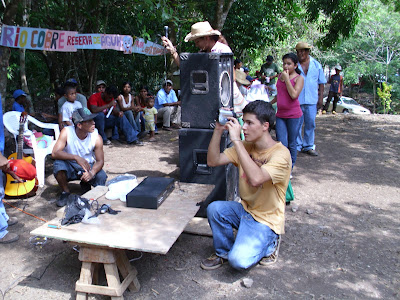Yikes! Since I am again ! My Blogger activities have increased.
I wanted to make a brief reference to an article I've found here in the office of CEPAS. It is about our Chef Luis, who was in Spain in February and then given to a English newspaper interview, when he was there to visit a English aid agency.
The article gives a pretty good overview of the situation of Panama in the large. The translation is not very perfect, because I've just done free hand ...
"In Panama have Cows and more land than people, "
Barcelona, Spain. He is Panameño and former Director of the Latin American Association for Radio Education. Luis A. Batista visited Barcelona for the start of the campaign against hunger to defend the country "by Manos Unidas (United Hands) being there that begins today in the parish of Santa Teresita.
 |
| The head of CEPAS, Luis Batista, in Spain for the Interview |
- Currently it is known to have finally overcome its historical residue. However, there are still serious problems in health, education, housing and communications ... and much poverty.
- And what about the world of the Indians?
- It survived about 200,000, of which 86% lives in extreme poverty. The situation of Panama's indigenous people with those of some African tribes comparable.
- What are their problems?
- Due to the exploitation of raw materials, especially gold and copper, the indigenous population lives in some devastated regions and mitm, Duch cyanide contaminated water, which is used to separate the raw materials of stone.
- And the Panama Canal?
- The progress made by the channel was very important. Wages in the Canal Zone are very good and the entire company is managed very well. However, it is not in the whole country to feel something.
- increases the disparity to continue?
- Yes. The rise and poverty aggravates the inequalities. The caste, which is in power, the more have plata (money), more and more away from the rest of society.
- What makes Manos Unidas there?
- you work in projects that will help people comes from their ignorance and responsible for their development. It is given that they too have a right to a dignified life. This is done by nature is protected.
- What happens to you in the process?
- We suffer a lot of heat and floods. It is true that in Panama there are people who have thousands of hectares and others not even one square meter, so that some cows have more space than people. The entire coast and its beaches have been sold to foreigners, who then built hotels, so that we can no longer go there.
- Is an agricultural reform necessary?
- Yes. But would limit the interest and power. Why should the people continue to organize and gather information.
- What about the Central American cooperation?
- The new authorities are forced to escape to Panama from the Central American agreement. I think they sympathize more with the Caribbean. Fortunately, we are Costa Rica's neighbors, because they are dealing with raw materials is a great role model.
Here's the original article in English:
Other side info:
- I have "cooked Niklas" a new journal under the title set up, where I in the near future a couple of recipes from the publish Panamanian cuisine will
- Starting tomorrow Wednesday, I'm in Buenos Aires to even get a group of students who organize there seminars on relief projects
- Next week we go into the rain forest region of Santa Fé, where we are at a medical walking tour, in which the people are cared for there
-> the means that for about 2 weeks now I can not bother with my blog ;-)
Until then, then!
your Niklas














